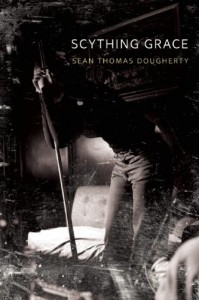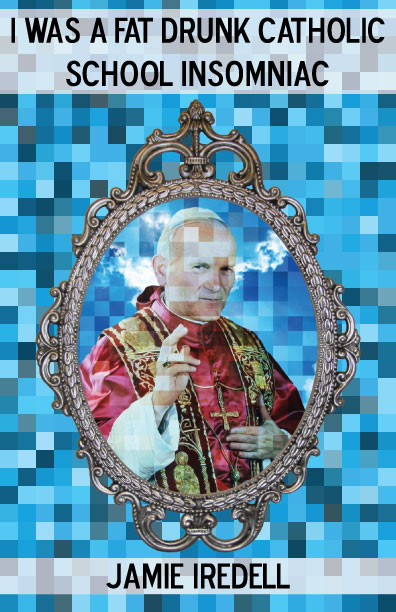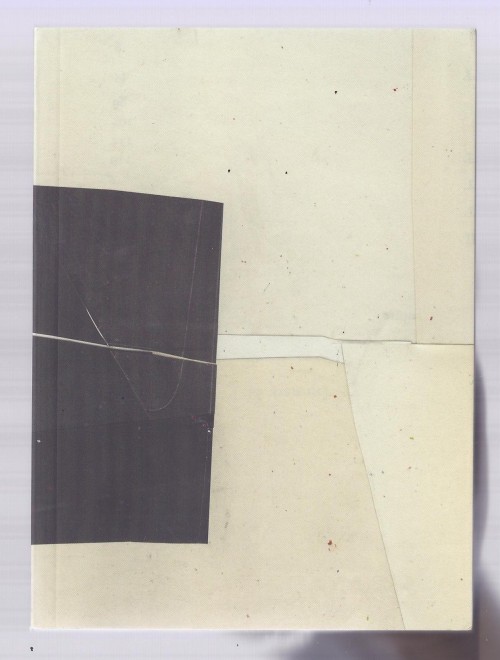5 Points: Whittling a New Face in the Dark (by DJ Dolack)
1) As you can see the cover of DJ Dolack’s just-released, debut collection of poetry, Whittling a New Face in the Dark (Black Ocean), has no text on the front cover (or the back, for that matter) and this is something DJ fought hard for. And that’s one of the great things about publishing a book through Black Ocean: the back and forth between publisher and author involves friendly fighting.
Yes, I speak from experience when I say that Black Ocean dialogues with authors on things both big and small. And this leads to much improved books.
2) DJ’s wonderful book comes at you, easily, like a parade (or procession) of Edward Hopper paintings rusting in strange twilight. Or the scenes from a moody Western, a northern, winter Western, dark-pale trees, bleak ice—hard-bitten characters staring out from and through the insistent and persistent landscapes.
3) this is page 19
Grandfather is alone in the yellow house
with the flea market pistol. READ MORE >
October 25th, 2013 / 10:33 pm
What Took Place Before the Bottom of the 7th in Game 2 of the World Series
Last nighttime the St. Louis Cardinals beat the Boston Red Sox in game 2 of the World Series, and their triumph made Baby Marie-Antoinette less woeful than she was on Wednesday night when the Cardinals lost (which they’re not supposed to do).
As with Baby Marie-Antoinette, I think the St. Louis Cardinals should win the World Series, and I also would be fine if their commendable closer, Trevor Rosenthal, wanted to be my boyfriend.
But this post right here sort of tackles another topic.
Before the bottom of the 7th inning, the Boston Red Sox commemorated all of the people who were blown up in the Boston Marathon.
They came out onto the field, and James Taylor sang a song.
This instance illustrated a theme from one of my favorite books, Frames of War by Judith Butler.
In this book, Judith distinguishes between greivable lives, like the people on the Boston Red Sox’s field, and ungrievable lives, like the Muslim creatures who continue to be blown to bits.
Being a boy, I like violence. But I don’t like phoniness, and it seemed to me to be really phony for all of these Boston Red Sox people to portray themselves as empathetic and moral-loaded and whatever other terms they might throw out, when, really, they’re only empathetic and moral-loaded to those who subscribe to America’s depiction of a grievable life.
Diadem: Selected Poems by Marosa di Giorgio
 Diadem: Selected Poems
Diadem: Selected Poems
by Marosa di Giorgio
Translated by Adam Giannelli
BOA Editions, Oct 2012
80 pages / $16 Buy from BOA Editions or Amazon
In Diadem, Di Giorgio’s prose-styled poems are a collage of images ranging from the surreal to the innocent and childlike. Shadows stalking about the farm house amongst rose gardens, God appearing as a face and speaking, and children performing plays in the garden. Giorgio speaks to us through these images, playing with them, distorting them, and living in them; she speaks of “The owls, with their dark overcoats, thick spectacles, and strange little bells”, and “Virgin Mary, enormous wing over my whole childhood and the whole countryside.” These images, contrasted with the speech-like prose style, paints surrealistic and beautiful pictures of culture, childhood, sexuality, and death.
“God’s here.
God speaks.”
As noted by the translator of the collection of poems, Adam Giannelli, these poems could be read as a novel, cover to cover, or on their own as individual pieces, and they would still have the same power and depth. The poems themselves blend and blur the lines between each other, in effect recreating an idea of recalling memories of the past; sometimes fantasy, sometimes all too real, and always fleeting and hard to properly pin down.
The poems themselves are often quick to change in subject matter and mood; often these poems begin with something childlike, like a story or a memory.
“We would put on plays in the gardens, at twilight, beside the cedar and carob trees; the show was improvised on the spot, and I was always afraid I wouldn’t know what to say, although that never happened.”
The poems often quickly turn, however, such as in this fragment. What is meant by a play is quickly distorted into something else; be it the anxieties of adolescence, maturation, or something more so. What makes these pieces stand out is that sometimes it is hard to know exactly what is happening, but it doesn’t take anything away from it.
“The mushrooms are born in silence; some are born in silence; others, with a brief shriek, a bit of thunder.”
The flexibility Di Giorgio employs with image, as well as grammatical constraints, helps give the pieces a somewhat corporeal feel; there is some sort of otherness to them.
“Each ones bears-and this is the horrible part-the initials of the dead person from which it springs.”
The themes turn so quickly that the reader almost can’t keep up. First one has this image of a mushroom growing in the ground, but being born of thunder turns the poem; why would there be thunder? And then, the initials of the dead are introduced, so perhaps these are supposed to symbolize some sort of cultural thing; death and rebirth. However, the piece makes another turn in the very next line.
“But in the afternoon the mushroom buyer comes and starts to pick them. My mother lets him. He chooses like an eagle. That one, white as sugar, pink one, grey one.”
Here now the subject has changed again; perhaps the mushroom buyer is reaping the spoils of war? Perhaps this is westernization? Maybe they are just regular mushrooms? It is these parallels of images working together, juxtaposing themselves rapidly and fluidly, which creates powerful pieces of poetry all under a single breath.
October 25th, 2013 / 11:00 am
An Interview with Sean Thomas Dougherty
I first met Sean Thomas Dougherty at my first AWP conference, Denver 2010. I had been wandering the overwhelming aisles of the Book Fair, wondering what I had gotten myself into, when I found myself at the BOA table. A book called Sasha Sings the Laundry on the Line caught my eye. That mesmerizing title with the Eastern European name, the cover art of colorful dresses and towels hanging between sooty apartment buildings, a wedge of blue sky above – it reminded me of my old neighborhood of Midwood, Brooklyn, and when I picked up the book I read the name. This was a guy whose poems I had long admired, and I hadn’t realized he had a new book out. When paying for Sasha, the BOA rep behind the table asked, “Would you like Sean to sign it?” I told her I needed to get going, but then she pointed behind me: reddish hair under a cool hat, big hooded sweatshirt, pale blue eyes, warm smile: Sean Thomas Dougherty. Signing his book, Sean wanted to know my story right away. He lit up when I told him I was a college dropout. “You’ve got to put that in your author bio,” he said.
Sean and I have kept in touch since Denver, mostly via email and Facebook. Sean is hands-down my favorite Facebook presence. His barbs at mediocre poetry, his posts of music videos on his “Punk Rock Sundays,” and his constant promotion of indie magazines and presses, as well as of the poets he loves, is something I look forward to daily. When I heard Sean had a new book in the works, I contacted him about doing an interview. That book, Scything Grace, is now out with Etruscan Press. Dougherty’s poems sing of the tough realities of American city life, with a voice influenced by Lorca and Vallejo, Levis and Hull, but a voice truly all his own. He draws close the lives and deaths of those he loves, and sees and hears the stories of the American poor and working class all around him. His poems from the beginning have challenged the division between poetry and prose, and are loyal to nothing if not sound, and great feeling. Poet Dorianne Laux has written that Dougherty is a poet “of grand and memorable vision . . . the gypsy punk heart of American poetry.”
In the following interview, conducted via email over a few days last May, Sean and I discuss Scything Grace, the line versus the sentence, Li-Young Lee, and the duende.
***
 Justin Bigos: Your latest book of poems, Scything Grace, shows you continuing to push the formal possibilities of your poetry, as well as hitting what I hear as a more recent note in your work: the voice of an older, more self-aware poet, who carries his ghosts through the streets and witnesses language and song everywhere, as if the world were scripting itself, singing itself daily into existence. Can we start our conversation by looking at this book as the next chapter in your life’s body of work? How have you changed as a poet since Sasha Sings the Laundry on the Line?
Justin Bigos: Your latest book of poems, Scything Grace, shows you continuing to push the formal possibilities of your poetry, as well as hitting what I hear as a more recent note in your work: the voice of an older, more self-aware poet, who carries his ghosts through the streets and witnesses language and song everywhere, as if the world were scripting itself, singing itself daily into existence. Can we start our conversation by looking at this book as the next chapter in your life’s body of work? How have you changed as a poet since Sasha Sings the Laundry on the Line?
Sean Thomas Dougherty: This is a hard question for me because I haven’t really “read” Scything Grace yet. It is an improvisatory collage. So I will answer in an improvisatory collage, which is the way I’ve started to write more and more in the last decade. The way closest to how I think, how I feel.
Back in May 2012 I was walking with my friend the poet Corey Zeller at the park on the west side of Erie, Pennsylvania, where I take our children to run through the last cherry blossoms. Pale petals we are. Sometimes when I walk I will just start talking to Corey poems and he will say, write that shit down. And I say, no one time. The poem is now gone. I’ve been doing this for decades for my friends. I say I am a walking saxophone. I say I am the words hiding all around us. Monk once said he has a hard time not hearing the music, it is everywhere, he wants to reach up and catch it as it passes us by. Flea, the bassist from Red Hot Chili Peppers, says the same thing. Everything has a beat. Think of a billion living things, the smallest insects. Human hearts. The rush of traffic. A swallow’s wings sing the air. I actually “write” very little all year. I write maybe two months and then the rest of the time I live, I collect, I listen, but I say poems all the time. I think part of being a poet is to live the poem, so I spontaneously make poems for the people I care about. I make poetry part of the fabric of us.
In May 2012 I had just finished a grueling grind-out manuscript for BOA of my Selected Poems to appear in 2014. Some of the poems in there I had been crafting for over six years. Corey’s best friend Jeremy, who I had known for years too, had just hung himself. Corey was dealing with his death and trying to write poems in his voice. It was spring. We walked carrying such weight. My love Lisa was very sick. My second daughter had been born in January. My oldest, Amara Rumi, was four. She ran with Corey’s son Malcolm. To live in a city of rust along a lake between nations. Our children are a lake between nations. Corey said now that you have finished your Selected you should write a book the way you speak poems. Just riff them fast. But write them down.
I said, yeah like Sonny Rollins playing with the birds on the Williamsburg Bridge. Legend has it when Rollins felt stuck he spent a year listening and playing with the birds on the bridge. He disappeared into life to find a new sound, a new tone. I needed to find a new tone. To return into the improvisatory language that drove me to poetry thirty years ago. For decades I’ve been pulled into the river. Now I gave myself permission to not swim but drown in it. I was also interested in writing much shorter lyric poems. My love Lisa is very sick and her favorite poems are my shorter lyric poems.
So two very important people in my life pushed me to make this book of short improvised lyrics. Then I expanded the breath to close. It is a Book of Breaths.
I started with a quote from Cavafy. In many ways the entire new book Scything Grace was driven by these lines from Cavafy’s poem “The City” :
“…I see the black ruins of my life, here,
Where I’ve spent so many years, wasted them destroyed them totally.”You won’t find a new county, won’t find another shore.
The city will always pursue you.
I wrote 80 percent of Scything Grace in a sort of old school improvisatory haze fueled by the duende, black coffee, and cigarettes over four weeks in May 2012. After I was done, I hit spell check, told my friends I was sending it out. It was done. I wrote it linearly one poem after another, day after day, sometimes two or three poems per day. I sent it out on a Saturday night in late June, I think, to Four Ways Books, Etruscan Press, and Black Ocean Books. On Monday afternoon Phil Brady of Etruscan called me up ecstatic to accept it.
JB: I’m really interested in how you articulate some of the paradoxes of the poem – at least the kind you write and are drawn to – especially the paradox of the poem as something received yet also made. It is you, Sean Thomas Dougherty, writing these poems—but as a kind of conduit, a witness. In that sense, the writing seems less about arranging sound and experience than transmitting it. If this is true, how do you know when to improvise, when to guide, when to allow your own will in there to have its say?

STD: You can’t teach someone to make metaphors, but you can teach the structure and examine how they are made or why certain images arise from the imagination, the way the French phenomenologist Gaston Bachelard in his profound book The Poetics of Space points to rooms, windows, doors, spaces intimate and grand, the juxtaposition between things, between worlds. But in the end there is an unnamable space to the making, that is the human spirit, soul I dare say, history of language and learning, the imagination made manifest in words. But it is also the body. The body remembers. So while the mind may let go the body becomes an instrument of sight, and very particular for the poet, of sound.
Civil Obedience
 About once a year I go to KFC, whose name (only a rumor, still very compelling) was changed from Kentucky Fried Chicken because the FDA refused to allow “chicken” in its name anymore; not technically, not since in vitro modification turned them into featherless big-titted avian mutants. I order the 3-piece crispy chicken, with mashed potatoes, gravy, and a biscuit so dense each bite is a choking hazard. The flesh is so tender, the bones so malleable — as if designed to fray at the gentlest human hand — I spread the breast convexly towards my mouth in the same fashion as one might eat the sliced side of a mango. The abstract expressionist-y garish pattern on the walls and/or booth cushions seem stuck in the ’80s, too depressive for nostalgia, as if we, as an entire race, had aesthetically plateaued. There’s an exuberant youthfulness to the 1:00 a.m. patrons of Taco Bell, and an underlining patriotism at Denny’s or even McDonald’s. The patrons at KFC seem involved in some collective Last Supper, each one seated alone in the center of a large table. I finish my meal in less than 20 minutes, my chin greasy like a productive cunnilingus session. Later that night, I vomit.
About once a year I go to KFC, whose name (only a rumor, still very compelling) was changed from Kentucky Fried Chicken because the FDA refused to allow “chicken” in its name anymore; not technically, not since in vitro modification turned them into featherless big-titted avian mutants. I order the 3-piece crispy chicken, with mashed potatoes, gravy, and a biscuit so dense each bite is a choking hazard. The flesh is so tender, the bones so malleable — as if designed to fray at the gentlest human hand — I spread the breast convexly towards my mouth in the same fashion as one might eat the sliced side of a mango. The abstract expressionist-y garish pattern on the walls and/or booth cushions seem stuck in the ’80s, too depressive for nostalgia, as if we, as an entire race, had aesthetically plateaued. There’s an exuberant youthfulness to the 1:00 a.m. patrons of Taco Bell, and an underlining patriotism at Denny’s or even McDonald’s. The patrons at KFC seem involved in some collective Last Supper, each one seated alone in the center of a large table. I finish my meal in less than 20 minutes, my chin greasy like a productive cunnilingus session. Later that night, I vomit.
Here’s something that has nothing to do with lists: Brooklyn Poets raising funds to launch THE BRIDGE, a social network that will allow new poets to find mentors, get critiques, and form communities with other poets. Contribute here and prove how comfortable you are.
Build The Bridge from Brooklyn Poets on Vimeo.
Jamie Iredell was a Fat Drunk Catholic School Insomniac
Now available for preorder from Future Tense (and for a limited time in hardcover) is freaky Jamie Iredell’s newest, an essay collection with the uncanny title, I was A Fat Drunk Catholic School Insomniac, funded by its even more uncanny cover:

Iredell’s essays never shy from getting up in the face of the nasty phases of one’s life, and how those phases make you into someone wiser, grateful to have survived. This book goes hard.
For a taste, check out his body-image-catalogying essay “Fat” at the Rumpus.
October 24th, 2013 / 2:10 pm
The NYTimes is starting a series about independent poetry publishers. The first interview is with Copper Canyon.
The Jade Cat
 The Jade Cat
The Jade Cat
by Suzanne Brøgger
Overlook Press, 2009
416 pages / $26.95 buy from Overlook or Amazon
Rating: 8.5
“All families are something something, lick your knees.” – Count Tolstoy
“The same phenomenon that makes the family so intolerable when you are young is precisely what makes it so fascinating when you are old: that concentraion of karma, old memory, and skeletons in the cupboard”– Suzanne Brøgger, The Jade Cat
The Jade Cat, by Danish author Suzanne Brøgger, follows the fortunes of the Løvin family (cosmopolitan Danish Jews) through the course of the 20th century.
Brøgger trades in melancholia, that old reliable bread and butter of Modernist anxiety. And like many great Émigré writers (Nabokov, Dolatov, Mukherjee, Gallant), she populates the novel with fetishes and talismen. Émigré literature trends towards interiors, landscapes of symbolic expression, in an attempt to recreate homeland or conjure the physicality of a lost homeland, and Brøgger nails the inventories of a family trying to hold onto something tangible. READ MORE >
October 24th, 2013 / 11:32 am
Laura Sims’s Practice, Restraint
Since my mommy purchased me Laura Sims’s collection of poems, Practice, Restraint, I have read it more than five times.
The poems are small and tiny. They hardly take up any space (although they do take up some space, of course). The lines leave room for few words; some, like the commencing verses of “Bank Twenty-Seven,” only hold one or four:
Trees over here
Over there
In one empty classroom
The girl is turning
The town inside out
Such sparseness spotlights the empty white space, which I like; it’s as if the few words of Laura’s poems are speaking to the empty white space, acknowledging that the empty white space isn’t really empty white space, rather, there’s something in it, the way an abandoned house at the end of street isn’t really abandoned, since ghosts live there.
Many of these poems pertain to scariness. There’s empty classrooms, empty rooms in general, trees, dead things coming out of mountains, a house that shines, and a girl in marsh. Each of these listed things could contain ghastly properties.
In the empty classrooms there could be girls getting ready to launch a school shooting because they were teased for not being capable of applying makeup correctly.
The house that shines might be doing so due to a bright apparition that resides in there and effects itself each night when it causes some kind of chaos.
Violence is a part of the poems. Laura compares girls’ “shining eyes” to “shiny new bullets.” She also remarks, “so many / dead girls / in this shit-hole.”
Though girls aren’t boys, they can still carry out violence, like Valerie Solanas did, like Mary Tudor did, and like the Jawbreaker girls did.
Some, like former secretary of state Colin Powell, believe overwhelming force is the best way to be violent. Others, like insurgent Muslim boys, believe a tiny and almost hidden force is better. The sensibilities of Laura’s poems align with the latter; just because you’re not doing lots of things and taking up lots of space in plain sight doesn’t mean that you’re not powerful.



